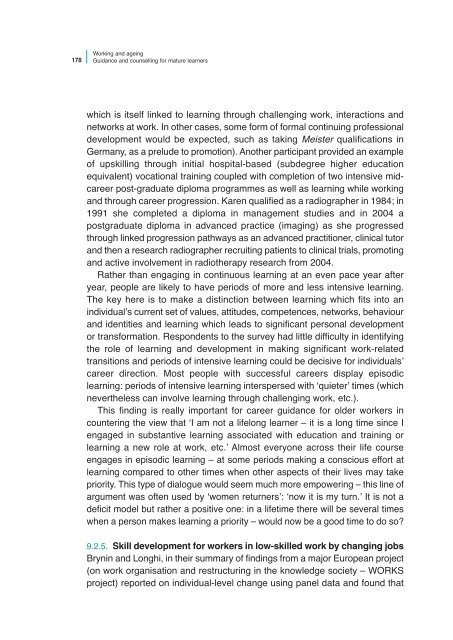Working and ageing - Cedefop - Europa
Working and ageing - Cedefop - Europa
Working and ageing - Cedefop - Europa
Create successful ePaper yourself
Turn your PDF publications into a flip-book with our unique Google optimized e-Paper software.
178<br />
<strong>Working</strong> <strong>and</strong> <strong>ageing</strong><br />
Guidance <strong>and</strong> counselling for mature learners<br />
which is itself linked to learning through challenging work, interactions <strong>and</strong><br />
networks at work. In other cases, some form of formal continuing professional<br />
development would be expected, such as taking Meister qualifications in<br />
Germany, as a prelude to promotion). Another participant provided an example<br />
of upskilling through initial hospital-based (subdegree higher education<br />
equivalent) vocational training coupled with completion of two intensive midcareer<br />
post-graduate diploma programmes as well as learning while working<br />
<strong>and</strong> through career progression. Karen qualified as a radiographer in 1984; in<br />
1991 she completed a diploma in management studies <strong>and</strong> in 2004 a<br />
postgraduate diploma in advanced practice (imaging) as she progressed<br />
through linked progression pathways as an advanced practitioner, clinical tutor<br />
<strong>and</strong> then a research radiographer recruiting patients to clinical trials, promoting<br />
<strong>and</strong> active involvement in radiotherapy research from 2004.<br />
Rather than engaging in continuous learning at an even pace year after<br />
year, people are likely to have periods of more <strong>and</strong> less intensive learning.<br />
The key here is to make a distinction between learning which fits into an<br />
individualʼs current set of values, attitudes, competences, networks, behaviour<br />
<strong>and</strong> identities <strong>and</strong> learning which leads to significant personal development<br />
or transformation. Respondents to the survey had little difficulty in identifying<br />
the role of learning <strong>and</strong> development in making significant work-related<br />
transitions <strong>and</strong> periods of intensive learning could be decisive for individualsʼ<br />
career direction. Most people with successful careers display episodic<br />
learning: periods of intensive learning interspersed with ʻquieterʼ times (which<br />
nevertheless can involve learning through challenging work, etc.).<br />
This finding is really important for career guidance for older workers in<br />
countering the view that ʻI am not a lifelong learner – it is a long time since I<br />
engaged in substantive learning associated with education <strong>and</strong> training or<br />
learning a new role at work, etc.ʼ Almost everyone across their life course<br />
engages in episodic learning – at some periods making a conscious effort at<br />
learning compared to other times when other aspects of their lives may take<br />
priority. This type of dialogue would seem much more empowering – this line of<br />
argument was often used by ʻwomen returnersʼ: ʻnow it is my turn.ʼ It is not a<br />
deficit model but rather a positive one: in a lifetime there will be several times<br />
when a person makes learning a priority – would now be a good time to do so?<br />
9.2.5. Skill development for workers in low-skilled work by changing jobs<br />
Brynin <strong>and</strong> Longhi, in their summary of findings from a major European project<br />
(on work organisation <strong>and</strong> restructuring in the knowledge society – WORKS<br />
project) reported on individual-level change using panel data <strong>and</strong> found that

















